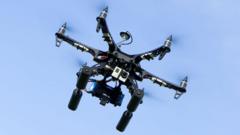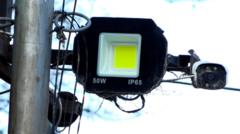In a decisive move, Germany has mandated its military to neutralize unauthorized drones in proximity to critical infrastructure, responding to allegations of increasing drone threats particularly tied to geopolitical tensions with Russia.
**Germany's New Drone Defense Strategy Near Military Installations**

**Germany's New Drone Defense Strategy Near Military Installations**
Germany's military prepares to intercept unauthorized drones as tensions escalate amid ongoing conflict.
Germany's cabinet has officially authorized the military to shoot down suspicious drones that breach airspace near military sites or other vital infrastructure. This decision was announced following a statement from Interior Minister Nancy Faeser, who highlighted the growing involvement of drones in security incidents since the onset of Russia's aggression against Ukraine. The rising frequency of such incidents has exposed the limitations of existing police technology in addressing potential aerial threats.
Concerns are high regarding Russia's involvement in a "shadow war" targeting Western countries that support Ukraine. Polish Prime Minister Donald Tusk recently stated that Russia had plans for acts of air terror not only against Poland but aimed at international airliners globally. Although detailed evidence was not disclosed, Tusk's remarks corroborate previous claims to U.S. President Joe Biden about similar threats. Last November, Polish authorities reported fires linked to courier companies suspected to be reconnaissance missions for potential sabotage.
The drone issue has gained urgency, with multiple sightings reported above military bases, including an incident involving ten drones over Germany's Manching Air Base. While current regulations only allow the military to assist police in controlling drone activity, new legislative proposals—pending parliamentary consent—would empower soldiers to shoot down drones if deemed necessary to protect lives or critical facilities.
The German government's resolution comes amidst a recent NATO initiative aimed at enhancing surveillance of critical undersea cables following previous incidents of damage—incidents that some suspect could be linked to Russian operations. As the situation unfolds, Western security officials remain vigilant, suspecting orchestrated sabotage campaigns attributed to Russia's military intelligence.
Amid these escalating tensions, German authorities emphasize the importance of adaptive security measures to combat potential espionage or sabotage, ensuring the safety and integrity of military operations and national infrastructure.
### Tags: Germany, Military, Drones, Security, Ukraine, Russia, NATO
Concerns are high regarding Russia's involvement in a "shadow war" targeting Western countries that support Ukraine. Polish Prime Minister Donald Tusk recently stated that Russia had plans for acts of air terror not only against Poland but aimed at international airliners globally. Although detailed evidence was not disclosed, Tusk's remarks corroborate previous claims to U.S. President Joe Biden about similar threats. Last November, Polish authorities reported fires linked to courier companies suspected to be reconnaissance missions for potential sabotage.
The drone issue has gained urgency, with multiple sightings reported above military bases, including an incident involving ten drones over Germany's Manching Air Base. While current regulations only allow the military to assist police in controlling drone activity, new legislative proposals—pending parliamentary consent—would empower soldiers to shoot down drones if deemed necessary to protect lives or critical facilities.
The German government's resolution comes amidst a recent NATO initiative aimed at enhancing surveillance of critical undersea cables following previous incidents of damage—incidents that some suspect could be linked to Russian operations. As the situation unfolds, Western security officials remain vigilant, suspecting orchestrated sabotage campaigns attributed to Russia's military intelligence.
Amid these escalating tensions, German authorities emphasize the importance of adaptive security measures to combat potential espionage or sabotage, ensuring the safety and integrity of military operations and national infrastructure.
### Tags: Germany, Military, Drones, Security, Ukraine, Russia, NATO






















